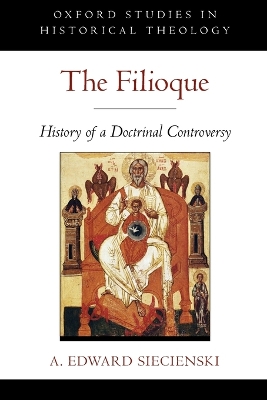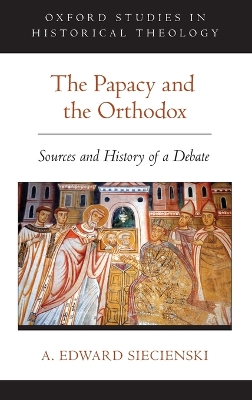Oxford Studies in Historical Theology
2 total works
The Filioque: History of a Doctrinal Controversy is the first complete English language history of the filioque written in over a century. Beginning with the biblical texts and ending with recent agreements on the place and meaning of the filioque, this book traces the history of the doctrine and the controversy that has surrounded it. From the Greek and Latin fathers, the ninth-century debates, and the Councils of Lyons and
Ferrara-Florence, to the twentieth- and twenty-first century-theologians and dialogues that have come closer than ever to resolving this contentious issue, A. Edward Siecienski explores the strange and fascinating history behind one of the greatest ecumenical rifts in Christendom.
Ferrara-Florence, to the twentieth- and twenty-first century-theologians and dialogues that have come closer than ever to resolving this contentious issue, A. Edward Siecienski explores the strange and fascinating history behind one of the greatest ecumenical rifts in Christendom.
The Papacy and the Orthodox examines the centuries-long debate over the primacy and authority of the Bishop of Rome, especially in relation to the Christian East, and offers a comprehensive history of the debate and its underlying theological issues. Edward Siecienski begins by looking at the sources of the debate, analyzing the history and texts that have long divided the Catholic and Orthodox world, and ends by examining the Second Vatican Council and
recent attempts at dialogue on the issue of the primacy. Starting with the historical Apostle Peter and the role he played in the early church, the book turns to the evidence long used in arguments for and against the Roman primacy. Siecienski details the 2000-year history of the papacy's reception-and
rejection-among the Orthodox, beginning with the question that continues to bedevil ecumenists: what was the role of the Bishop of Rome during the time of the undivided church? Although Eastern attitudes towards the papacy often differed depending on time and place, by the time the First Vatican Council (1870) defined the pope's infallibility and universal jurisdiction-doctrines the Orthodox vehemently rejectedit was clear that the papacy, long seen by Catholics as the ministry of unity, had
become the chief obstacle to it. Siecienski masterfully brings together all of the biblical, patristic, and historical material necessary to understand this longstanding debate. This book is an invaluable resource as both Catholics and Orthodox continue to reexamine the sources and history of the
debate.
recent attempts at dialogue on the issue of the primacy. Starting with the historical Apostle Peter and the role he played in the early church, the book turns to the evidence long used in arguments for and against the Roman primacy. Siecienski details the 2000-year history of the papacy's reception-and
rejection-among the Orthodox, beginning with the question that continues to bedevil ecumenists: what was the role of the Bishop of Rome during the time of the undivided church? Although Eastern attitudes towards the papacy often differed depending on time and place, by the time the First Vatican Council (1870) defined the pope's infallibility and universal jurisdiction-doctrines the Orthodox vehemently rejectedit was clear that the papacy, long seen by Catholics as the ministry of unity, had
become the chief obstacle to it. Siecienski masterfully brings together all of the biblical, patristic, and historical material necessary to understand this longstanding debate. This book is an invaluable resource as both Catholics and Orthodox continue to reexamine the sources and history of the
debate.

